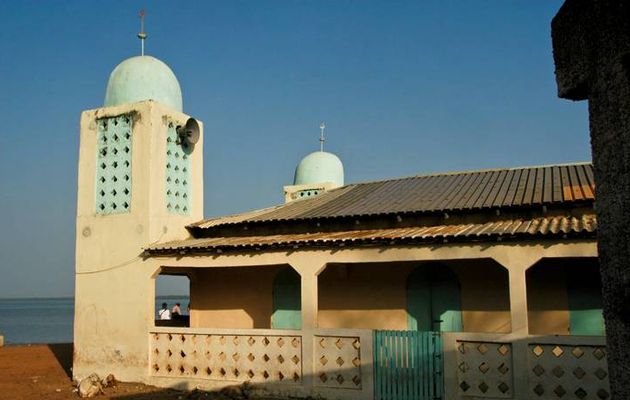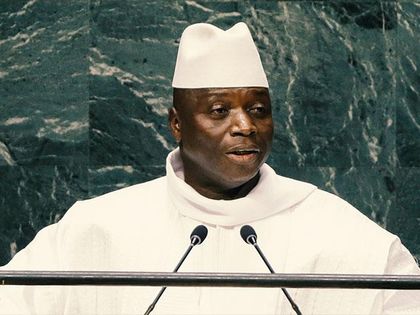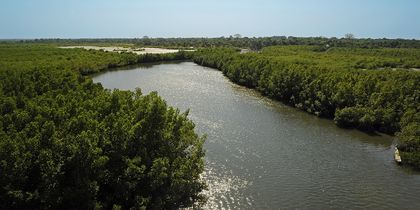Muslim leaders have caused upset by validating President Jammeh's declaration of Gambia becoming an Islamic state without having a referendum.
 A mosque in Banjul, capital city of Gambia.
A mosque in Banjul, capital city of Gambia.
On February 18, Gambia celebrated its 51st anniversary. The small African republic has 1.7 million inabitants, and is one of the poorest countries of the world.
Last December, President Yahya Jammeh declared the country, in which 9 out of 10 people are Muslim, an Islamic republic.
Gambia is now the second official Islamic state in Africa.
“ALLAH’S RELIGION IS NOT NEGOTIABLE”
Jammeh followed Pakistan, Iran, and fellow African nation Mauritania's leaders, who also identify their countries as Islamic states.
"Accepting Allah's religion as your religion and as your way of life is not negotiable." the President affirmed.
He added: “In line with the country's religious identity and values, I proclaim The Gambia as an Islamic State.”
POLITICAL AND MEDIA OPPOSITION
Hamat Bah, the opposition National Reconciliation Party leader, criticised the decision: "There is a constitutional clause that says that Gambia is a secular state, you cannot make such a declaration without going through a referendum."
The national media also questioned the decision: "This is an affront to the Constitution of the Gambia, which is based on secular traditions and it does not support that any religion is enshrined as the state religion." one of the newspaper's editorials said.
In order to defend the president's declaration, the Gambia Supreme Islamic Council (GSIC) convened a 300-person conference, which included representatives from the Vice President office. They called for peace among Muslims and between Muslims and those of other faiths.
 President Yahya Jammeh.
President Yahya Jammeh.
MINORITIES IN DANGER
Jammeh hastened to assure Christians that this declaration did not threat their freedom to practice their faith safely.
"Christians should be respected and the way they celebrate Christmas or whatever, simply continue. In the relationship between religions, no one has the right to interfere with the life of the other." the president stated.
In January 2016, more than 200 Islamic leaders from all over the world signed the Marrakesh Declaration calling for religious freedom for non-Muslims in majority-Muslim countries. Read more.
THE DRESS CODE ISSUE
Many were sceptical about his declaration, even when he confirmed that there will be no dress requirements as a result of the new status:
"I have not appointed anybody as an Islamic policeman." Jammeh said. "The way women dress is not your business; you are Muslim, she is a Muslim; you should not tell her how she should dress, it is not your business, in the next world you cannot defend her."
However, weeks after his declaration, he issued an executive order banning all female civil employees from working with their hair uncovered. The law lasted just one week, because opposition groups protested causing Jammeh to abandon it and allow women to work without the Islamic head covering.
 Gambia river.
Gambia river.
“A REPONSE TO THE CURRENT REALITY OF GAMBIA”
Jammeh explained that the decision to declare the country an Islamic state “was a response to the current reality in Gambia, a British colony until 1965.”
"As Muslims are the majority in the country, Gambia cannot afford to continue the colonial legacy." he argued.
A CLOSER RELATIONSHIP WITH THE ARAB WORLD
The president has held power in Gambia since his 1994 coup, and has a "deplorable Human Rights record and rampant corruption", Jeffrey Smith, senior advocacy officer at the Robert F. Kennedy Center for Justice and Human Rights, told Al-Jazeera.
“He is desperately attempting to foster a closer and more lucrative relationship with the Arab world. He is trying to cozy up with other parts of the world that harbour anti-West sentiments." Smith added.
“ISLAMIC EXTREMISM IS PRESENT”
A Pew Research study reported in 2010, that Christians make up about 5% of Gambia’s population.
More than half of this group is Roman Catholic, while Protestants make up 1.5 percent of the total population.
Although Gambia is not listed on the Open Door's 2016 World Watch List, “Islamic extremism as a persecution engine is present in the country.” the organisation warned.
"Non violent measures are taken to islamise the country, particularly the educational system/institutions, public institutions, media, and marriage/family." Open Doors concluded.

Las opiniones vertidas por nuestros colaboradores se realizan a nivel personal, pudiendo coincidir o no con la postura de la dirección de Protestante Digital.
Si quieres comentar o